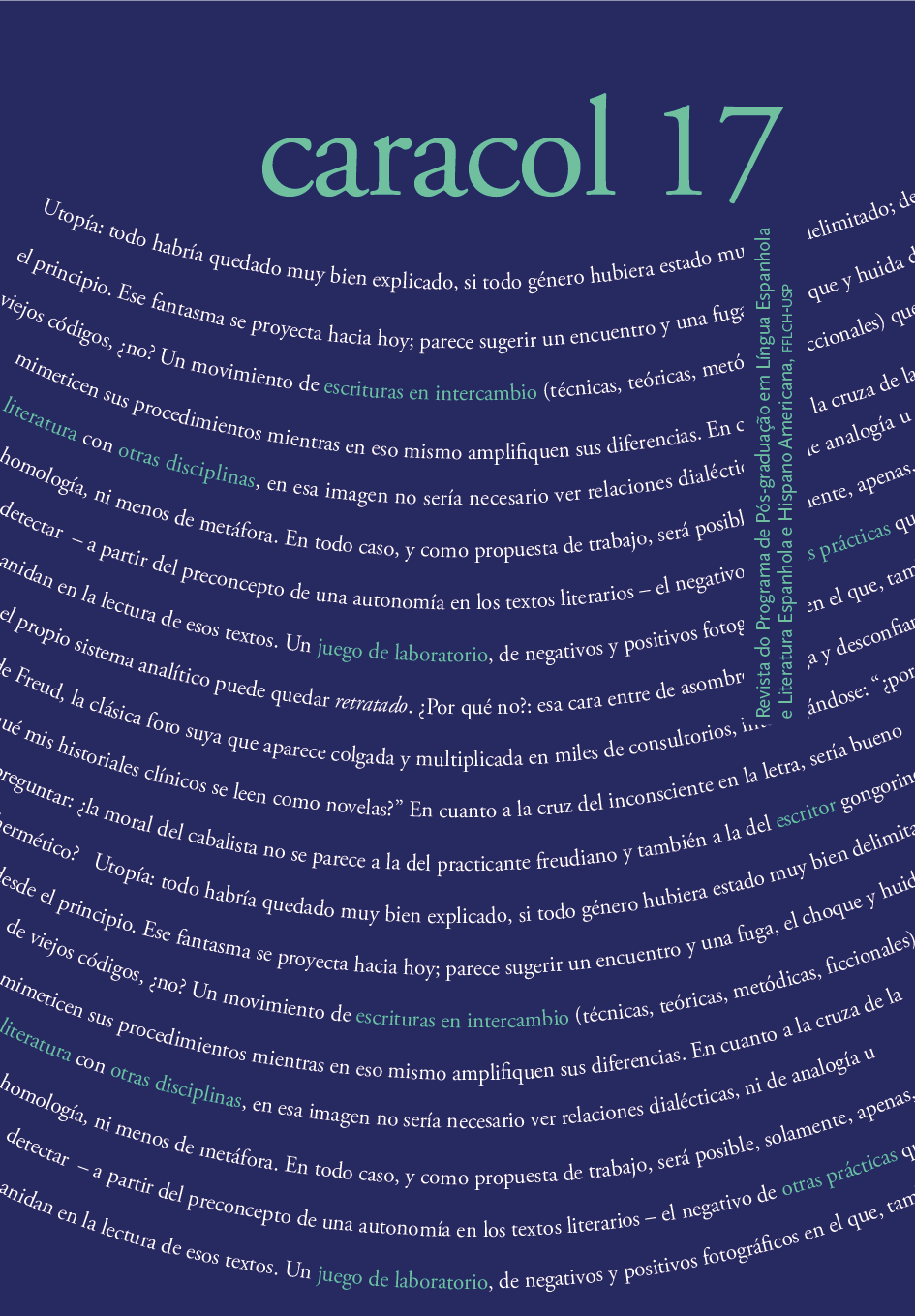Autofiction in the novel El orden del mundo
DOI:
https://doi.org/10.11606/issn.2317-9651.v0i17p373-397Keywords:
Biography, Bio/graphy, Autofiction, Auto/fiction, NovelAbstract
This paper analyzes El orden del mundo by Ramiro Sanchiz from the perspective of autofiction. We analyze two elements in the novel: the global idea of the book, and the narrator’s complexity. This analysis, combined with Mainguenau’s bio/graphy concept, allows us to ponder over the deconstruction of the novel and of autobiography by not accepting them as antithetical poles as far as the capacity of representing the authorial I goes. Second, we dialogue with scholars who discuss, from a theoretical perspective, the autofiction concept in El yo fabulado (Casas, 2014). This dialogue yields our suggestion to abandon the perspective that considers autofiction a literary genre or subgenre. We propose a semiotic displacement of the term autofiction towards auto/fiction, in which the slash expresses the opacity, instability and reciprocity that constitute the relationship that comes to be between the authorial I and the text when we deal with writing a manuscript that will fall somewhere within the autobiography-novel interval.
Downloads
References
Arroyo Redondo, Susana. “El diálogo paratextual de la autoficción”. In: CASAS, Ana. (Ed.) El yo fabulado. Nuevas aproximaciones críticas a la autoficción. Madrid: Iberoamericana-Vervuert, 2014, e-book Kindle.
Casas, Ana. (Ed.) El yo fabulado. Nuevas aproximaciones críticas a la autoficción. Madrid: Iberoamericana-Vervuert, 2014, e-book Kindle.
Chiappara, Juan Pablo. Ficciones de vida. La literatura de Carlos Liscano. Montevideo: Ediciones del Caballo Perdido, 2011.
Chiappara, Juan Pablo. “La vista desde el puente de Ramiro Sanchiz: una apuesta por lo fantástico más allá del realismo post y transnacional.” In: Revista EstudosLinguísticos e Literários, Salvador: 2017, v. 1, p.26-37, 2017.
Chiappara, Juan Pablo.“El proyecto Stahl y la novela Nadie recuerda a Mlejnas: nuevas perspectivas literarias y culturales en el Uruguay del siglo XXI.” In: Almeida de Freitas, Luciana Maria et al. (Org.) Anais do VIII Congresso Brasileiro de Hispanistas. Estudos de literatura e cultura. Rio de Janeiro: ABH, 2016, pp. 516-524, e-book. Disponible en <https://drive.google.com/file/d/0B_fPPa-m93xDcE5nYTNYQ3pWZzg/view> Consultado el: 2 mayo. 2018.
Cusset, François. Teoria francesa. A influência de Foucault, Derrida, Deleuze & Cia. Trad. Fátima Murad. Porto Alegre: Artmed, 2008.
Nietzsche, Friedrich. Más allá del bien y del mal. Madrid: Alianza editorial, 1996.
Maingueneau, Dominique. O contexto da obra literária. Trad. Maria Appenzeller. 2. Ed. São Paulo: Martins Fontes, 2001, 202 p.
____________________ Le discours littéraire : Paratopie et scène d´énonciation. Paris: Armand Colin, 2004. 262 p.
Pérez Castillo, Pablo; Rodríguez López, Araceli. (Coord.) Escrituras del yo: conjeturas. Ciudad de México: Universidad Autónoma de Querétaro & Ediciones Eón, 2013, e-book Kindle.
Preciado, Beatriz. Manifesto contrassexual. Práticas subversivas de identidade sexual. São Paulo: Editor N-1, 2014.
Sanchiz, Ramiro. El orden del mundo. La Paz: Editorial El Cuervo, 2014.
Sanchiz, Ramiro. El orden del mundo. Montevideo: Editorial Fin de Siglo, 2017.
Schmitt, Arnaud. “La autoficción y la poética cognitiva”. In: Casas, Ana. (Ed.) El yo fabulado. Nuevas aproximaciones críticas a la autoficción. Madrid: Iberoamericana-Vervuert, 2014, e-book Kindle.
Vásquez Rodríguez, Gilberto. “Condición de verdad y ficción (literaturas del recuerdo y autoficción)”. In: Casas, Ana. El yo fabulado. Nuevas aproximaciones críticas a la autoficción. Madrid: Iberoamericana-Vervuert, 2014, e-book Kindle.
Volpi, Jorge. Leer la mente. El cerebro y el arte de la ficción. México: Alfaguara, 2011.
Zambra, Alejandro. No leer. Buenos Aires: Excursiones, 2012.
Downloads
Published
Issue
Section
License
Copyright (c) 2019 Juan Pablo Chiappara

This work is licensed under a Creative Commons Attribution-NonCommercial 4.0 International License.
Authors who publish in this journal agree to the following terms:
- Authors retain copyright and grant the journal the right of first publication, with the work simultaneously licensed under a Creative Commons Attribution License, which permits the dissemination of the work with recognition of authorship and initial publication in this journal.
- Authors are allowed to enter into additional contracts separately for non-exclusive use of the version of the work published in this journal (such as publication in an institutional repository or as a book chapter), with recognition of authorship and initial publication in this journal.
- Authors are allowed and encouraged to publish and distribute their work online (e.g., in institutional repositories or on their personal page) at any point before or during the editorial process, as this can generate productive changes, as well as increasing the impact and citation of the published work (see The effect of open access…).




